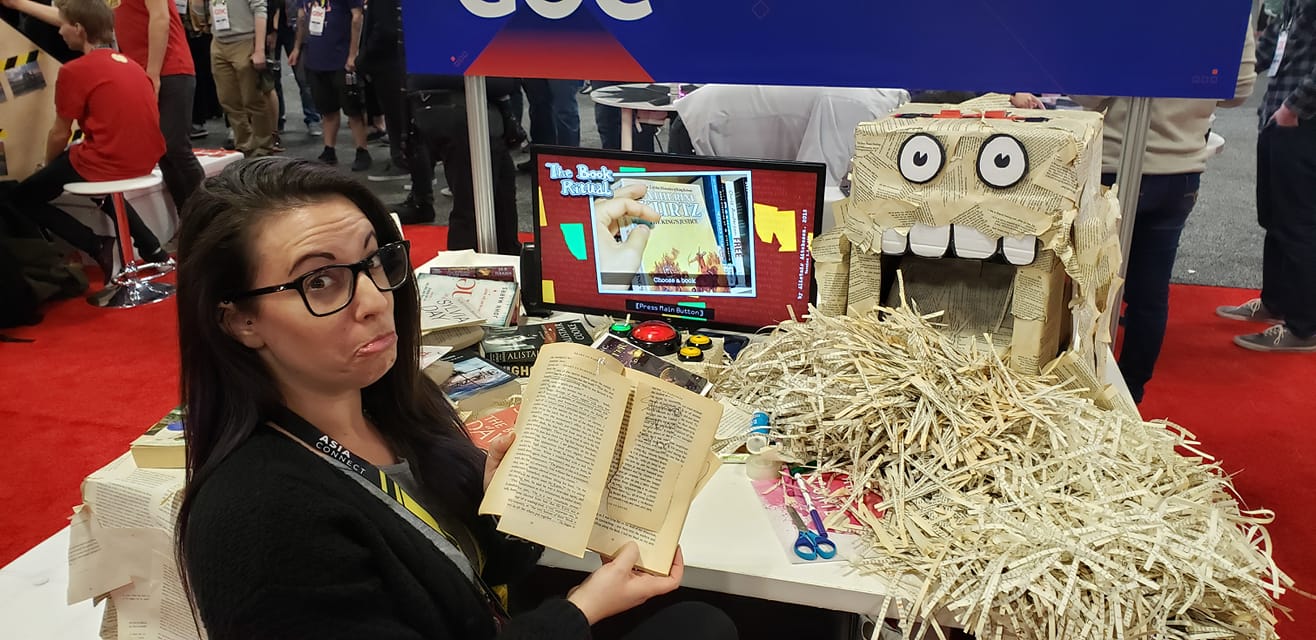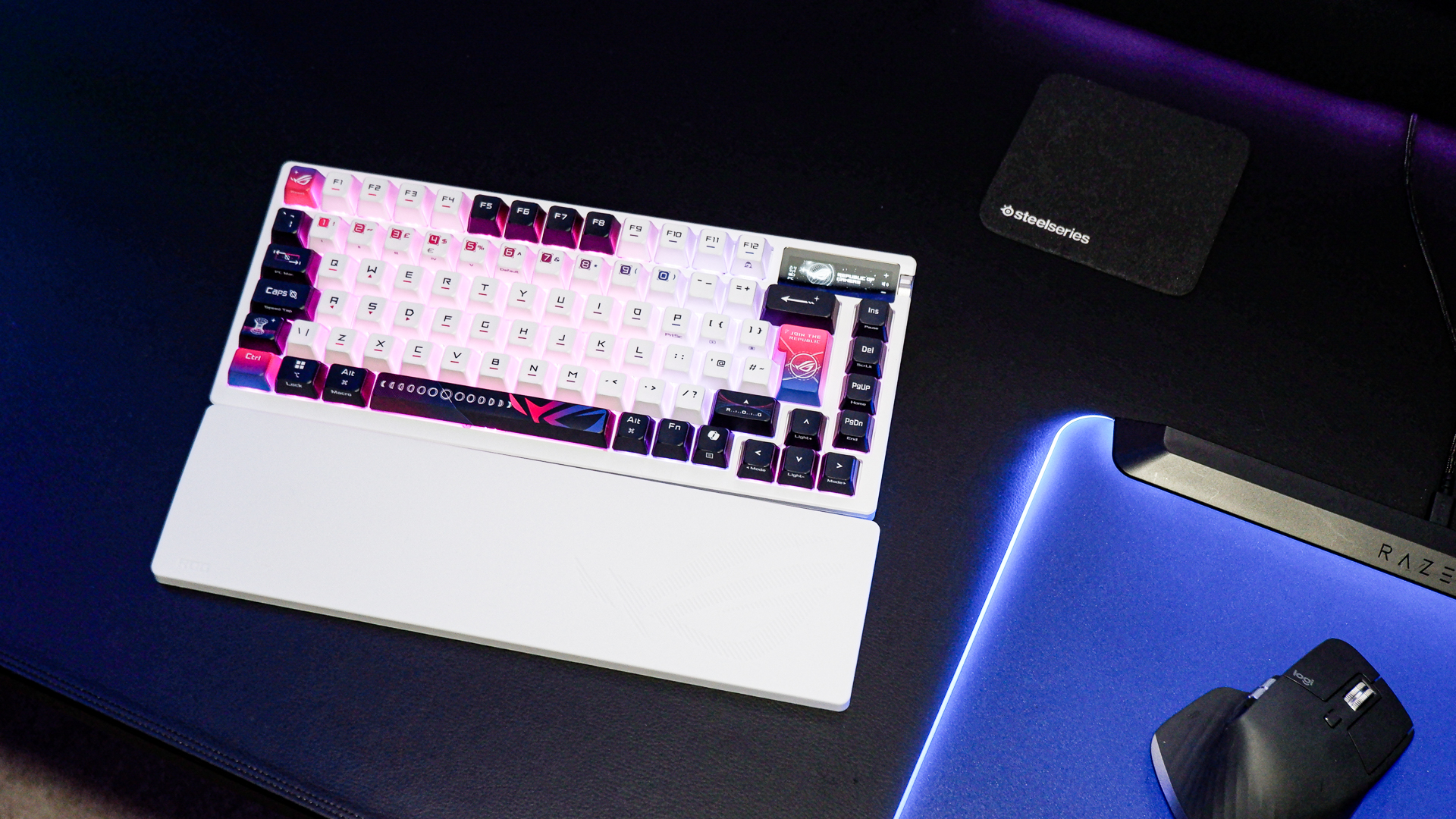This game destroys real books to help players cope with grief
The Book Ritual asks you write over, blackout, cut and paste, and shred pages from a book to deal with loss and accept change.

The Book Ritual asked me to do something unorthodox for any book lover. It wanted me to rip a page out of my book and put it through a shredder. But I knew this was a core aspect to the game, one of many featured at alt.ctrl.GDC back in March, which is a special showcase for indie games played with 'alternative' controllers. In The Book Ritual, the alternative controller is a paper shredder connected to a PC via a USB cable, and you have to tear out real pages from a real book and shred them to progress in the game.
But there’s logic behind this seemingly mad action: The Book Ritual is about dealing with loss, accepting change, the permanence of decisions, and how physical objects can lose their meaning over time. To get the most out of it, you not only have to be willing to tear and shred pages from a book, but you also have to be willing to explore the darkest caverns of yourself.
It turned out I was more ready to shred a book than I was to explore those caverns, but The Book Ritual has a way of making you feel comfortable enough to share your most personal thoughts. If you are willing to shred a page from your book, then you are more likely to be emotionally along for the ride, the game’s creator, Alistair Aitcheson, tells me during a candid and heartfelt interview. Aitcheson is intimately familiar with all themes in The Book Ritual, as he started creating it when he was trying to process an emotionally tough period in his life.
“I was having to deal with grief in my life in a way I hadn’t previously. I was finding it sort of difficult to talk about what was really getting to me, and I found myself starting to close off a bit, because I couldn’t express what it was I wanted to say.”
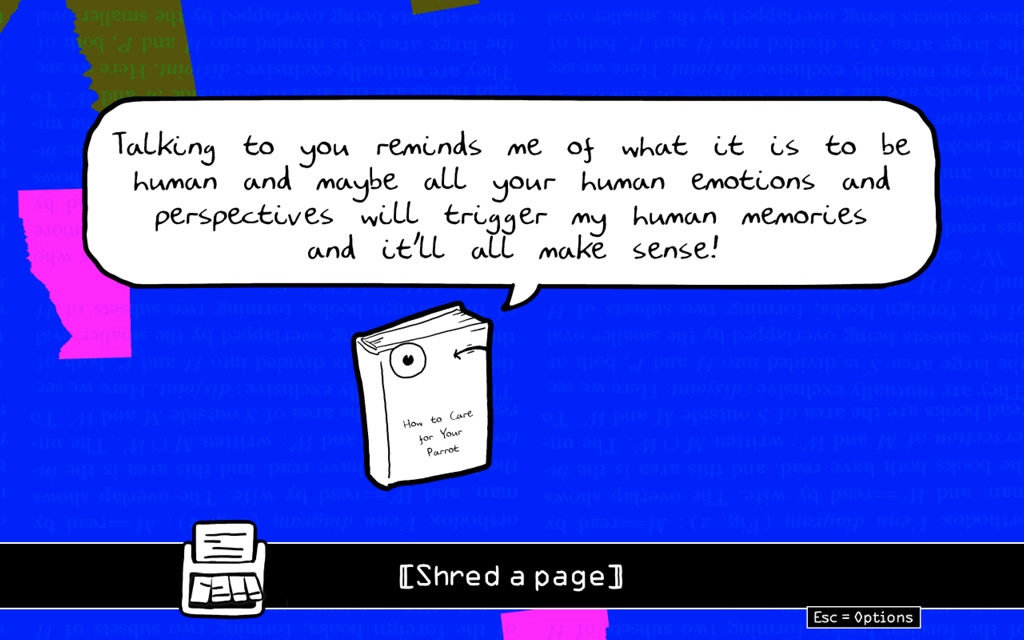
Writing journal entries about that difficult period acted as a catalyst of sorts, leading Aitcheson to eventually come up with the basic concept for The Book Ritual—a departure from his previous games, especially the ones that incorporate audience participation. Exploring different concepts in his journal started to feel like he was capturing the emotions he was having trouble expressing. At first, Aitcheson thought he wanted to make another interactive stage game, but quickly realized that format wouldn’t be the best for The Book Ritual.
“It was a forced experience. It didn’t feel like there was a way to approach the player on a human level, where you’re inviting them in and you’re reaching out to them and saying ‘what about you?’ That’s an important part of connecting to people.”
There were many things he wanted to say about how he was processing his own grief, but felt venting at the player wasn’t the right way to create a personal experience. Instead, he turns outward in his game, asking the player how and what they feel—and to record that in the pages of their book. He accomplishes just that.
Keep up to date with the most important stories and the best deals, as picked by the PC Gamer team.
It felt weird at first, but the shredding process became cathartic, and eventually the only important thing about the book were the words I wrote in it.
Your guide through the game—or perhaps more appropriate, emotional companion—is a cute, unassuming book. “Over the course of our time together, I’m going to ask you to write inside me, and draw inside me, and we’re going to play little games and exercises together too!” it says to me at the beginning of the game. Okay, this little book seems nice. Then it asked me to put a page in the shredder. I knew that moment would come, but I didn’t expect it so soon.
I took a deep breath, ripped a page from the spine like a Band-Aid, put it into the shredder, and watched as it split the page into several thin strips and added it to the massive pile next to the computer. It felt weird at first, but the shredding process became cathartic, and eventually the only important thing about the book were the words I wrote in it, prompted by questions like, “Have you lost a thing that was special to you?” and “Is there one heartbreak that hits you the hardest?”
The Book Ritual doesn’t always ease you into some of the heavy questions, but the privacy of treating the book in your hand like your personal journal makes it easy to open up about anything you are willing to explore emotionally—and you are free to shred any of the pages you write on, if you want. Shred pages like they’re fleeting emotions. Or, you can keep the pages. There isn’t a ‘right’ way to play the game when it comes to choosing what pages to shred.
“I’m very happy with this range of different approaches that people have, because one of the things that I wanted to do was allow people to approach it in their own way. Whatever way you’re doing it, you’re doing it right.”
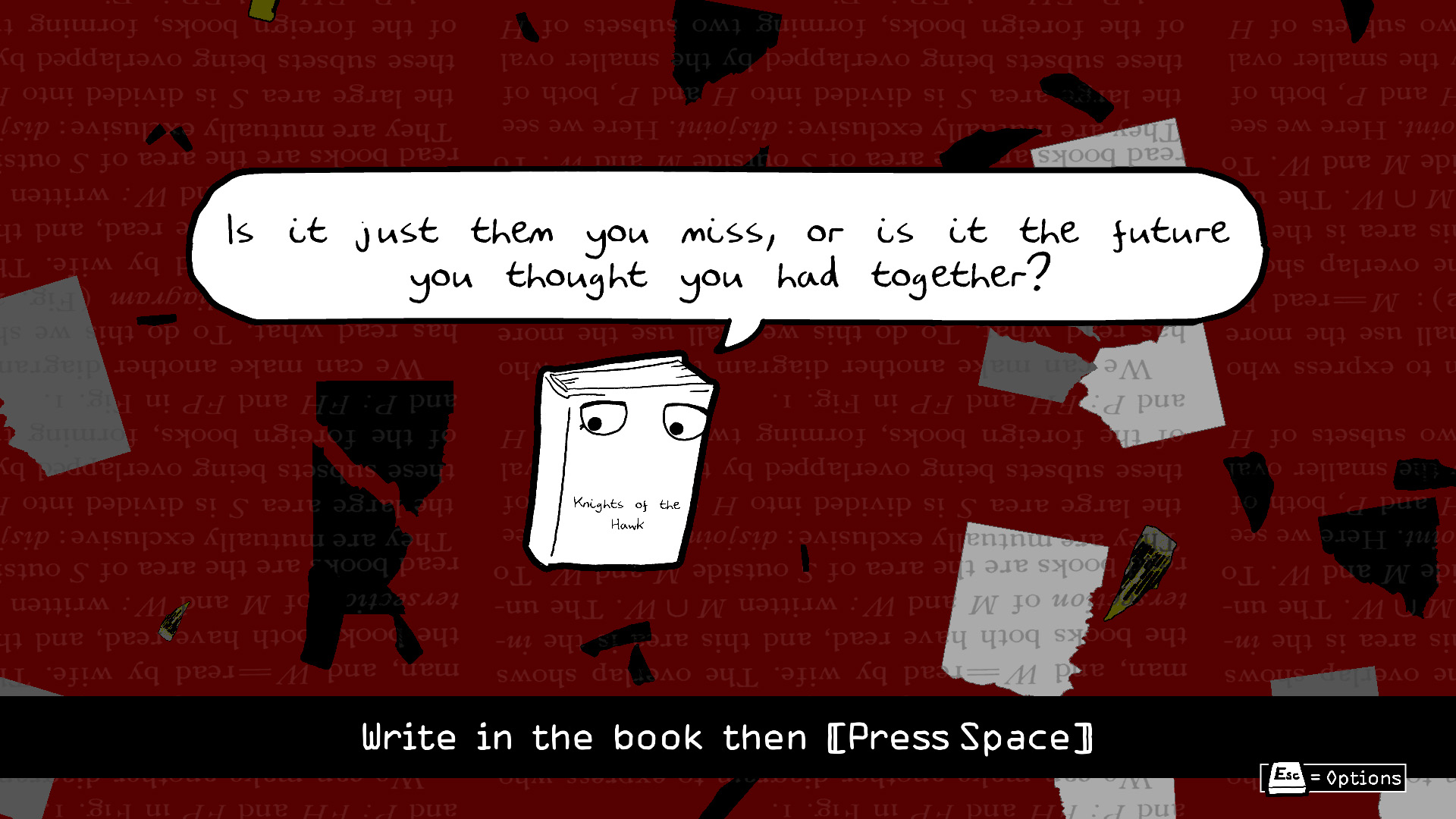
In between the hard-hitting questions, your book-guide is there for some comedic relief of sorts, but Aitcheson mainly wrote the character as his inner child, the vulnerable side of him at that point in time. But like all of us, the book grows and matures as the game goes on. It asks us to be true to who we are right now, not to be someone we’re not. It’s the culmination of our life experiences that have put us where we are today, whether or not we have suffered to any degree. Suffering does not lead to growth, but growth can come from suffering, as Aitcheson puts it.
It’s what he hopes the most for those who play The Book Ritual, that they experience some sort of growth or at least be able to reflect on the growth they’ve had. What growth looked like for Aitcheson as he was making his game boiled down to two words: acceptance and compassion—acceptance for that which has transpired and compassion for oneself during the grieving process. And he found those things for himself by creating the character of the book in his game.
“Putting those questions and those feelings and those fears into another character and having them express it, and then being able to sort of see that as another person and show it a level of compassion, it showed me that I was capable of showing myself the same level of compassion that hadn’t been able to at that point.”
You can’t force yourself to get rid of grief, or pretend it isn’t there. That’s exactly the thing The Book Ritual helped me realize.
As with compassion, a feeling of acceptance eventually arrived, which coincided with Aitcheson becoming more comfortable talking about the ‘grief’ aspect of his game. Seeing the positive response to The Book Ritual allowed him to eventually become more open about the game as a whole and why he made it. Being willing to talk about some of the most emotionally hard periods of your life is no small task, especially when you create something out of your own grief; there’s a certain level of emotional attachment to your work that I don’t think can ever disappear. Aitcheson carefully points out to me that there was no magic turning point for him with either of these things—it just took time.
“All of these things have added a little pebble to a jar called ‘acceptance.’ Eventually, that jar gets fuller, and you go ‘I’ve got a jar full of acceptance pebbles!’ But no individual pebble has made the jar full.”
I immensely appreciate his pebble analogy, filling a jar up with positivity a little at a time. It’s not a single thing that makes you ‘better,’ but rather little things over time. You can’t force yourself to get rid of grief, or pretend it isn’t there. That’s exactly the thing The Book Ritual helped me realize.
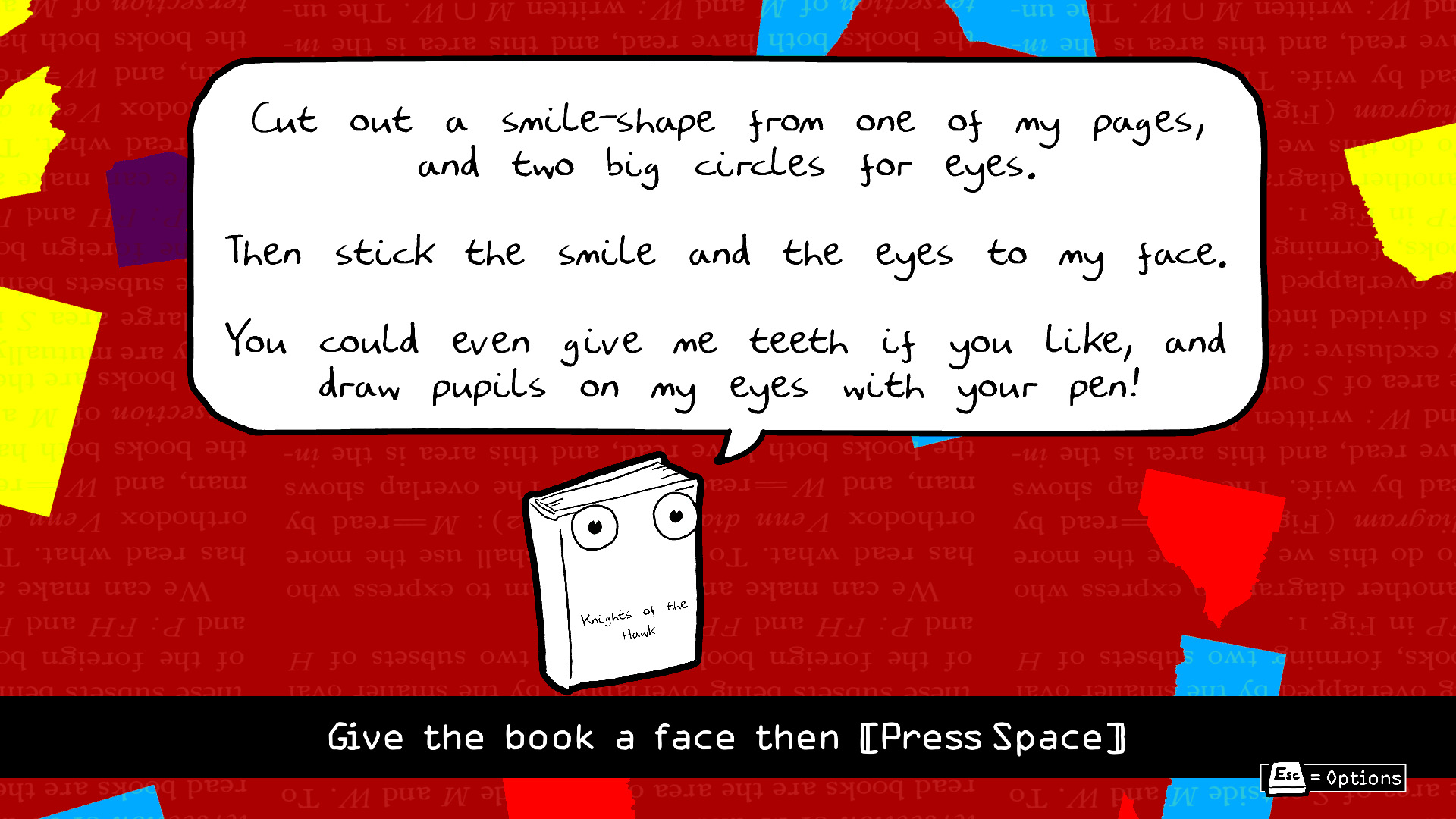
I told Aitcheson a little bit about what I wrote in my book, both at GDC and after: I lost my father in November 2018. Like Aitcheson, I found myself (and still find myself) dealing with grief in a way I haven’t before; I was the administrator of my dad’s medical directive, which means I was the one who gave his doctor permission to remove him from life support. We also had an estranged relationship. There’s no defined way for how to deal with something like that, but some of the specific questions that The Book Ritual asked me were questions that, up until that point, no one asked me. And also like Aitcheson, I didn’t know how to process what I was feeling, but instead of closing off to people, I pushed those emotions away. I was afraid of them. The Book Ritual helped me start to face them.
The game is available for free, so, once I got home from GDC, I pulled another book from my shelf and went through the entire game a little at a time. The game allows you to rip pages out and throw them away in a trash can if you don’t have a shredder. It’s not as permanent as shredding, but it gets the point across, and seeing that I don’t own a shredder, it was the best option.
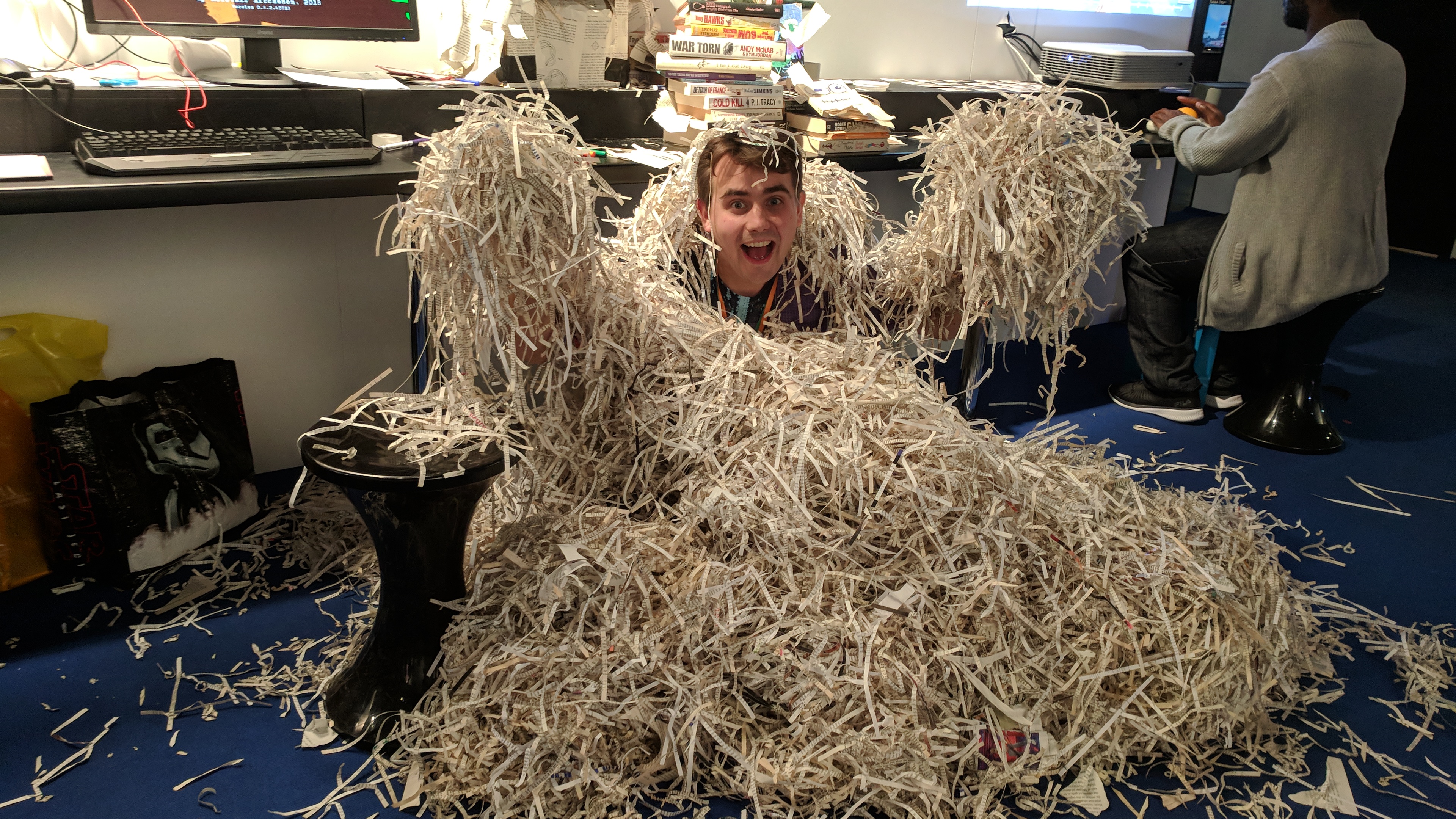
I wrote more about my dad. I wrote about how I got out of an abusive relationship. I wrote about things that made me happy too, but whatever I wrote down, I choose not to discard. Having them written down in my nearly illegible, hybrid printing-cursive handwriting gave them validity, gave everything I was feeling validity, regardless of the emotion.
The two books I ripped apart lost their meaning. I wasn’t mortified that I had damaged a book beyond repair. I didn’t feel guilty for doing one of the most unspeakable actions any book lover could do to a book. At the end of the day, it was just a material possession that had no influence on my own emotional journey.
At the end of our conversation, I asked Aitcheson if there was anything else he wanted to say about The Book Ritual. He asked me how I was feeling instead. He wanted to make sure I was okay. I’m good, I said. I’m still working through a lot of guilt, working on not blaming myself for the way things ended, but I’ve got way more acceptance pebbles in my jar than I did a few months ago.
The Book Ritual is one hell of an emotional rollercoaster, but the grief I carry around with me everyday gets smaller because the game helped me confront it.
